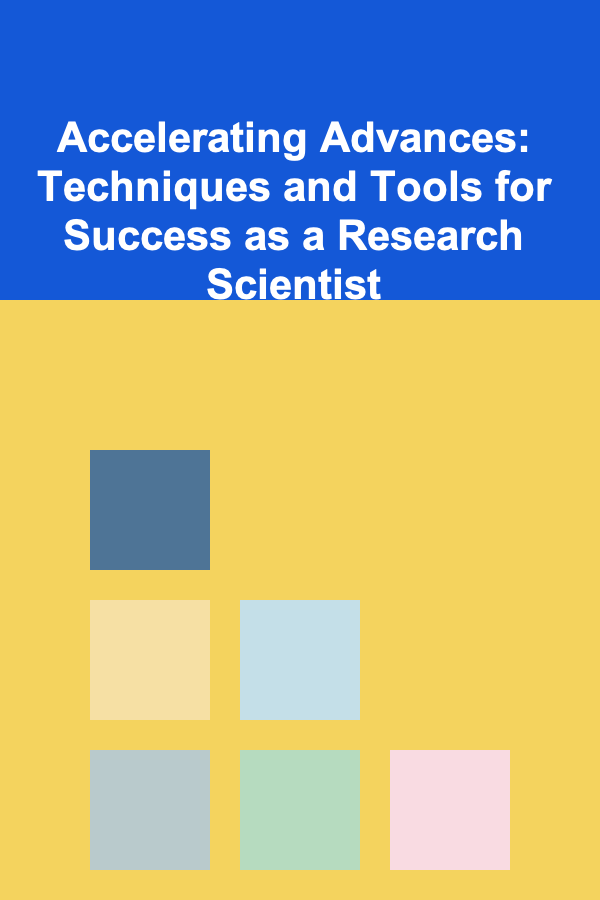
Accelerating Advances: Techniques and Tools for Success as a Research Scientist
ebook include PDF & Audio bundle (Micro Guide)
$12.99$10.99
Limited Time Offer! Order within the next:

In the ever-evolving landscape of research and innovation, the role of a research scientist is more crucial than ever. From pioneering new discoveries to developing groundbreaking technologies, research scientists are at the forefront of scientific progress. However, to excel in this highly competitive and demanding field, researchers must equip themselves with a blend of technical expertise, creativity, organizational skills, and access to the latest tools and techniques. This guide aims to provide actionable insights for accelerating success as a research scientist, offering practical strategies, essential tools, and techniques that can optimize productivity and foster meaningful breakthroughs.
Building a Strong Research Foundation
A successful research career is built on a solid foundation of knowledge and skills. Before diving into advanced techniques or state-of-the-art tools, it's essential to focus on the core areas that will support your growth as a researcher.
Master Your Domain
Whether you are in biomedical research, physics, chemistry, or any other scientific field, a deep understanding of your domain is indispensable. This includes staying updated with the latest literature, understanding the history and context of your field, and being familiar with key theories, experiments, and methodologies.
Actionable Steps:
- Read Widely and Regularly: Subscribe to top-tier journals, attend conferences, and follow blogs or forums related to your area of research. Keeping up with the latest publications ensures that you are aware of emerging trends, techniques, and findings.
- Engage in Critical Thinking: Don't just consume research passively. Instead, critically analyze the methodologies, conclusions, and potential biases in the studies you read. This helps you develop a more nuanced understanding of the field and informs your own work.
Develop Your Technical Skill Set
Research often involves complex experiments, data analysis, and problem-solving. Having a diverse skill set is essential for tackling the variety of challenges that come with scientific work.
Actionable Steps:
- Become Proficient in Key Software : Learn and master software tools that are widely used in research, such as MATLAB , Python , R , or GraphPad Prism for data analysis. These tools allow you to manipulate large datasets, visualize results, and perform sophisticated statistical analysis.
- Understand Experimental Design: Effective research begins with designing reproducible, well-structured experiments. Learn how to optimize variables, control for bias, and ensure that your experiments can stand up to rigorous peer review.
Embracing Collaboration and Networking
Scientific research is rarely a solitary endeavor. Collaborating with other scientists, researchers, and professionals from different disciplines can bring new insights, accelerate progress, and increase the scope and impact of your work.
Building a Network
Networking with other scientists and researchers can provide you with valuable connections, mentorship opportunities, and potential collaborators. A strong professional network also helps you stay informed about funding opportunities and cutting-edge technologies.
Actionable Steps:
- Attend Conferences and Workshops: Engage with researchers from various institutions, industries, and backgrounds by attending academic conferences, symposia, and specialized workshops. These events are excellent for sharing ideas, gaining new perspectives, and forming partnerships.
- Join Online Communities : Participate in online forums, mailing lists, or social media groups dedicated to your field of research. Platforms like ResearchGate and Twitter provide spaces for real-time updates and discussions on recent advances.
Effective Teamwork
Collaborating within interdisciplinary teams can provide diverse perspectives and innovative solutions. Working effectively in a team involves good communication, respect for different expertise areas, and the ability to adapt to the needs of the project.
Actionable Steps:
- Set Clear Roles and Expectations: When working in a team, it's essential to define roles clearly. Ensure everyone understands their responsibilities, deadlines, and how they contribute to the project's overall objectives.
- Foster a Collaborative Environment: Encourage open communication, idea sharing, and constructive feedback. Being receptive to different viewpoints often leads to creative breakthroughs.
Leveraging Cutting-Edge Tools and Technologies
The pace of research is accelerating, thanks to technological advancements. Modern tools and technologies can significantly enhance research productivity and outcomes. From computational simulations to high-throughput data analysis, these tools offer unprecedented capabilities for researchers.
Harnessing Computational Power
Many research fields today rely heavily on computational models, simulations, and big data analytics. Whether you're modeling molecular behavior in chemistry or analyzing large genomic datasets, computational tools are central to modern research.
Actionable Steps:
- Utilize High-Performance Computing (HPC): For tasks involving heavy computational loads, HPC platforms allow you to run complex simulations or process large datasets quickly. Familiarize yourself with available HPC resources at your institution or through cloud-based services.
- Learn Machine Learning and AI: Machine learning algorithms are increasingly used in scientific research to analyze vast amounts of data and uncover patterns that would be impossible to identify manually. Learn about the basics of machine learning and how it can be applied to your research.
Big Data Analytics
The volume of data generated by modern research is staggering. Big data analytics tools enable you to handle, process, and derive insights from massive datasets.
Actionable Steps:
- Master Data Analysis Tools : Use software such as Python (with libraries like Pandas , NumPy , and SciPy ) and R to analyze complex datasets. These tools allow for statistical analysis, machine learning, and data visualization, all of which are crucial for modern research.
- Data Visualization : Tools like Tableau , ggplot2 , and Plotly enable you to create compelling visualizations of your data, which are essential for interpreting complex results and presenting them to a wider audience.
Automation of Routine Tasks
One of the most valuable tools in research today is automation. Repetitive tasks such as data collection, analysis, and even literature searches can be automated to save time and improve efficiency.
Actionable Steps:
- Automate Data Collection : Use software tools to automatically collect experimental data or scrape relevant literature from online databases like PubMed or Google Scholar. This frees up your time to focus on higher-level analysis and interpretation.
- Scripting and Workflow Automation : Learn how to write custom scripts in Python or Bash to automate repetitive tasks, such as data cleaning, statistical analysis, or report generation. This increases consistency and reduces human error.
Optimizing Productivity and Managing Time
Research can be overwhelming, with multiple tasks and deadlines demanding attention. Developing effective time-management strategies is crucial for maintaining productivity and avoiding burnout.
Setting Goals and Prioritizing
Setting clear, actionable goals and priorities will help you stay on track and ensure that your research is progressing effectively.
Actionable Steps:
- Break Down Large Tasks: Instead of focusing on a broad, overwhelming task, break it down into smaller, more manageable chunks. For example, if you are writing a research paper, divide it into specific sections such as literature review, methodology, results, and conclusions.
- Use the Pomodoro Technique: This time-management technique involves working in focused intervals (typically 25 minutes) followed by short breaks. It helps maintain focus and reduces mental fatigue.
Leveraging Project Management Tools
Keeping track of tasks, deadlines, and collaborations is easier with project management tools. These tools help you organize research tasks, set milestones, and communicate with collaborators.
Actionable Steps:
- Use Tools like Trello or Asana: These tools are excellent for tracking tasks, creating timelines, and ensuring that research objectives are met.
- Maintain a Lab Notebook (Digital or Physical) : Consistently document your experiments, observations, and ideas. Digital platforms like Evernote or Labster can help you organize and store this information efficiently.
Maintaining a Work-Life Balance
While scientific progress is exciting, it's important to avoid burnout by maintaining a healthy work-life balance.
Actionable Steps:
- Set Boundaries: Establish clear working hours and personal time. Research can often extend beyond traditional hours, but it's important to protect your mental health and well-being.
- Take Regular Breaks: Step away from your work periodically to recharge. Engaging in hobbies, exercise, and spending time with loved ones can improve your productivity in the long run.
Securing Funding and Publishing Your Work
For most researchers, securing funding and effectively publishing their work are essential milestones in their careers. These activities can provide the resources needed to conduct experiments and share your findings with the scientific community.
Seeking Research Grants
Research funding is highly competitive, but with the right approach, you can secure the necessary resources to advance your work.
Actionable Steps:
- Identify Potential Funding Sources : Explore government grants, private foundations, and industry partnerships that fund research in your field. Websites like Grants.gov or FunderFinder can help you locate suitable opportunities.
- Write a Strong Proposal: Craft a compelling research proposal that clearly defines your objectives, methodology, and expected outcomes. Make sure to highlight the significance and potential impact of your work.
Publishing and Disseminating Research
Publishing in peer-reviewed journals is a critical part of a research scientist's career. Effective dissemination of your findings ensures that your work contributes to the scientific community and advances knowledge in your field.
Actionable Steps:
- Target the Right Journals : Choose journals that align with your research's subject matter and impact. Tools like Elsevier's Journal Finder can help you identify suitable publications.
- Be Prepared for Revisions: Peer reviews often come with constructive criticism. Be open to feedback and use it to improve the quality of your work.
- Promote Your Research : Once your work is published, share it on platforms like ResearchGate , LinkedIn, and Twitter. Engaging with the community increases your research's visibility and potential impact.
Conclusion
The journey to success as a research scientist is multifaceted, requiring a combination of foundational knowledge, technical skills, effective collaboration, and the use of cutting-edge tools. By mastering your domain, building strong networks, embracing the latest technologies, optimizing productivity, and securing funding, you can accelerate your research and make meaningful contributions to the scientific community.
Ultimately, the most successful researchers are those who continue to learn, adapt, and innovate, pushing the boundaries of knowledge while maintaining a healthy balance between their professional and personal lives.

How to Create a Cozy Fireplace Mantel Display for the Holidays
Read More
How to Evaluate and Invest in Peer-to-Peer Lending Platforms
Read More
How to Make the Most of Your Home Budget with Simple Adjustments
Read More
How to Organize Your Workshop or Craft Room Paperwork
Read More
How to Use Affirmations in Your Decor for Positive Energy
Read More
How to Use Security Signs and Stickers to Deter Crime
Read MoreOther Products

How to Create a Cozy Fireplace Mantel Display for the Holidays
Read More
How to Evaluate and Invest in Peer-to-Peer Lending Platforms
Read More
How to Make the Most of Your Home Budget with Simple Adjustments
Read More
How to Organize Your Workshop or Craft Room Paperwork
Read More
How to Use Affirmations in Your Decor for Positive Energy
Read More